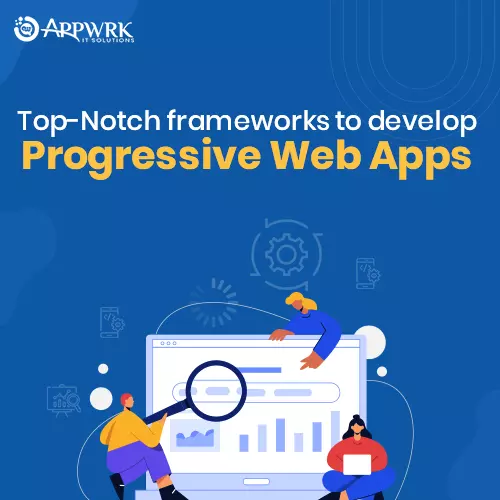Node.js vs Angular: Choose The Best JavaScript Framework
The evolving trends in web and mobile app development timely change the demand for programming languages. Right now, JavaScript is leading the programming world with 64.96%( Source: StackOverflow).
JavaScript has evolved as a compelling server-side application from a client-side scripting language. It is one of the lightweight languages and is blessed with first-class functions.
Out of all the JavaScript-based technologies, we will compare the two most emerging ones- Node.js vs Angular in this blog. So keep reading it till the end if you want to choose the best JavaScript technology for your next project.
The first step in the success of any application is selecting the right framework!
Do you know if this decision goes wrong, it can affect your application’s final look and feel and overall desired functionality?
Talking about Node.js vs Angular, the former is used widely in developing server-side web applications, while latter is mainly used in making robust client-side cross-platform web apps.
Look at the below table for a quick comparison
Both these frameworks have their unique features and specialties; hence it is quite complicated to figure out the best option for your business.
But not to worry, in this write-up, we are elaborating all the required information related to these JavaScript frameworks. Moreover, we will dive deeper into understanding the difference between them and see how useful they are for Application Development.
Without further delay, let’s start this journey of Node.js vs Angular.
Node.js vs Angular: Let’s start from Basics

Node.js is a runtime JavaScript environment that can be used to develop server-side JS applications in a hassle-free manner. Node.js is an event-driven JavaScript framework that runs on a plethora of platforms like Windows, Linux, Mac OS X, and Unix. This framework was developed in 2009 by Ryan Dhyal.

Along with efficiency, Node.js provides a non-blocking Input/Output model, which is best for real-time data-intensive apps running on various devices. It is an ideal framework for scalable, data-intensive, and server-side web applications. Moreover, Node.js offers a vast library of multi JavaScript modules to ease the development process.
So if you want to develop an intuitive web application, then Node.js will go perfectly with your needs, and you can hire a Node JS developer easily as well.

Top Features of Node.js

Scalability:
This framework solves the major issue of application development, and that’s scalability. Generally, everyone prefers highly scalable applications these days; hence Node.js is a good choice as it allows scaling of applications both horizontally and vertically, which helps improve the performance.
Caching:
Node.js supports caching of modules. Node.js is cached into the application memory when a Node.js module is requested for the first time. We don’t need to re-execute the codes as caching increases page load speed.
Event-based and Asynchronous:
As Node.js is asynchronous by default, it operates in a non-blocking way. It means it checks if the request involves any database interaction or not. If it doesn’t, the server sends back the client’s response.
High Performance:
Node.js is built on Google Chrome’s V8 JavaScript engine, which results in faster code execution. There are various other reasons behind this framework’s high performance. Some of them are concepts like asynchronous programming and how it operates on non-blocking input-output operations.
Unit Testing:
In Node.js, developers can easily test the written code using significant unit testing called Jasmine.
Single-Threaded:
This framework operates on the “Single Threaded Event Loop Model” architecture. This architecture can handle multiple client requests.
What is Angular?

Angular is an open-source structural framework for developing dynamic web apps. It was launched in 2009 by Google, but now it is maintained by a community of other passionate developers along with Google. This framework is mainly used for creating applications having separate functional layers and single-page applications.

This framework allows developers to use HTML as the template language and lets HTML syntax express application components briefly but clearly. One of the main reasons why this framework wins the heart of developers is its Model-View-Architecture( you will read about it later in this blog). This MVA architecture enables the building of interactive and data-driven web apps. Hence it is the most preferred JavaScript framework as a result.

Top Features of Angular

Generating Codes:
This framework can turn templates into highly optimized codes for JavaScript virtual devices. It offers all the advantages of codes that are hand-written. Besides this, it provides the efficiency of the framework to the developers.
Codes Splitting:
A new component router can deliver automatic code-splitting, which results in faster loading of Angular front-end applications. In this way, the users only load the code, required to provide the view they have requested.
Easy-to-Use:
It is one of the easiest JavaScript frameworks compared to others because it can easily decouple the DOM manipulation from your favorite app logic.
Integrated Development Environment (IDE):
Various feedback, such as intelligent code completion, instant errors, etc. can be gained in integrated development environments and popular editors.
Efficient Two-Way Data Binding:
This is one of the crucial features of Angular. The view and model layers stay in perfect synchronization and exactly represent each other. In this way, development time decreases.
Node.js vs Angular: Deep Comparison

We will compare both of these JavaScript frameworks based on various parameters those are:
- Popularity
- Architecture
- Performance
- Learning Curve
- Programming language and Paradigm Support
- Installation & Deployment
- Working with Data
- Framework Size
- Community Support
- Migration
Popularity
According to SimilarTech,


Worldwide Node.js usage by website

Worldwide Angular usage by website

Now, let’s check the Node.js vs Angular popularity on Google Trends.

By looking at the above graph, we can say that Angular is more searched on Google compared to Node.js


Architecture
Node.js uses a “Single Threaded Event Loop” architecture to administer multiple consumers simultaneously. This framework employs an event-driven, non-blocking i/o model that makes it efficient, lightweight, and the best choice for the real-time data-intensive applications that run across distributed devices.
Check out the Node.js architecture in the below image, stating the function of a server that is built utilizing this framework.

Angular employs Model-View-Whatever architecture and is hence capable of supporting patterns like Model-View-Controller or Model-View-View-Model.
Model– This level is responsible for maintaining data and managing application data. It is the lowest layer and responds to the instructions from the controller to update itself and to the request from view.
View– They are script-based template systems such as ASP, JSP, and PHP responsible for showing all kinds of data to the user. It is quite easy to integrate with AJAX technology.
Controller– It responds to user input and interacts with the data model objects. As the name suggests, the controller controls the interaction between the model and the view.

Performance

Performance is one of the crucial factors in the success of any application. In terms of performance, Node.js uses virtual DOM for memory allocation and higher performance. On the other hand, Angular comprises multiple features that slow down the performance when dealing with heavy applications. Hence out of Node.js vs Angular, Node.js is the clear winner considering performance.
Learning Curve
In Node.js, you will take just a few days to learn it if you have done any project in JavaScript. But you have to understand the concepts of backend development like incoming request routing and database querying to get a master’s in this framework.
Moreover, Node has built-in APIs, enabling you to make all kinds of servers, including TCP, HTTP, DNZ, etc. Hence you can become a versatile developer by exploring this framework.
TCP, HTTP, DNZ, etc. Hence you can become a versatile developer by exploring this framework.
While Angular is a full-fledged framework, it takes time to master it, You must understand from basic concepts like services and decorations to even more complicated constructs like RxJS and observables. However, not all of these concepts will be used in your project, but it is still required to understand Angular’s structure and component management.
The best part of working with Angular is that the error messages are very clear, so advancing and debugging your skill is relatively easier.
Programming Language and Paradigm Support
Although both Node.js and Angular are based on JavaScript, they’ve started supporting other languages over the past few years to develop web apps other than JavaScript. Both these frameworks also support various commonly used programming paradigms.

Installation & Deployment
Although we can write Node.js applications in JavaScript, but as Node.js is a JavaScript runtime environment, the application is required to run within the runtime environment on multiple platforms (Windows, Linux, and macOS). Thus developers must install Node.js on their computer in order to use it and develop Node.js web applications.
On the other hand, Angular developers do not require any installation process. They can use this framework by just embedding it in the code.
Working With Data
Node.js enables developers to write database queries even in non-relational databases such as CouchDB and MongoDB; hence developers can easily develop web applications using Node.js.
On the other hand, Angular’s MVW architecture supports two-way data binding. This bidirectional binding helps synchronize the data between visual components and web applications. The only drawback is it lacks the feature of writing database queries.
Community Support
Both Node.js and Angular, being popular technologies, come with great community support. However, Node.js is an open-source community, but it takes some time to gain popularity. Node.js is getting support from various ways, including-
- Asking for General Help
- Reporting an Issue
- Code contributions
- Becoming a collaborator
- Community Discussions
- Learning Node.js
- Community Committee
- Node.js Meetups
- Start Contributing to Node.js
On the other hand, as Google maintains angular, it soon gained popularity and started getting support from the Angular developer’s community.
Framework Size
The file size of Node.js and Angular is 80KB and 500KB. Hence for developing lightweight applications, Node.js is a good choice, while for creating heavy applications Angular will go best.
Migration
Migration is the process of adapting a newer version of any technology or framework or simply updating the current version to a new version.
Node.js offers a wonderful migration tool that enables Node.js developers to switch to a new version easily, as nearly 90% of APIs don’t require any change.
While Angular developers experience two cycles of updates, regular updates come once every six months.
Node.js vs Angular: Pros & Cons
Node.js: Pros & Cons

Pros:
- Use the same code for the client-side and server-side.
- Enables streaming of big files.
- NPM is one of the top advantages.
- It is easier to learn
- It consists of a vibrant and large support community.
Cons:
- Node.js encourages tasks based on web servers and not on the CPU
- This framework has messed up comparative issues and callback with the database
- One needs to have entire knowledge of JS before starting to work with this framework
- Scaling of resources is quite tough as it uses only one CPU which cannot run multiple tasks.
Angular Pros & Cons

Pros:
- It allows you to develop eye-catchy and extraordinary UI designs.
- It supports flexible framework testing.
- It offers auto-data integration between model view and elements.
- It comes with a vast template creation solution and a huge Angular library.
Cons:
- This framework functions slowly in the case of interactive elements installed pages.
- It provides only restricted routing and sometimes makes third-party integration complicated.
- If gone wrong, you can’t easily debug scopes
- In Angular, elements used by DOM sometimes throw performance issues.
Node.js vs Angular: Use Case

Node.js is best for
- Real-time web applications and small-sized projects.
- Building web applications and website development.
- Building scalable network web applications
- Facilitating tracking user actions and system monitoring dashboard at an actual time.
Angular is best for
- Building large-scale, real-time and dynamic web apps.
- Developing real-time applications like chat messaging and instant apps.
- When reliable and easy scalability is on priority.
- Creating single-page and interactive applications.
- Developing web applications that are integrated with object-oriented programs.
Frequently Asked Questions
-
Node.js vs Angular, which is easy for beginners?
Node.js is relatively easy to learn for beginners as compared to Angular because Node.js makes file I/O really easy with the built-in filesystem (fs) module. While in the case of Angular, you’ll need abstraction and high-level functions to manage all that JavaScript and performance.
-
Is Node.js a framework or language?
Node.js is a cross-platform framework. It uses JavaScript languages as its main interface. Its runtime environment is established in c++ and allows developers to manipulate the files on the system.
-
Which is better out of Node.js vs Angular?
As Node.js has the feature of a non-blocking I/O model and is event-driven, it is comparable lightweight and efficient. At the same time, Angular is best for building single-page applications and applications that have separate functional layers.
Final Call
We hope that this blog will help you to decide between Node.js Vs Angular– which framework is best for your dream project?
However, this decision depends entirely on your project requirements and the functionality you want to put in your application. Hence understanding your project needs properly and deciding on the goals is the very first step to the success of your application.
If you need any help in figuring out what all functionality should be there in your application depending on your business needs, reach out to our experienced developers and make a wise decision.
About The Author







 Free Quote
Free Quote
















































